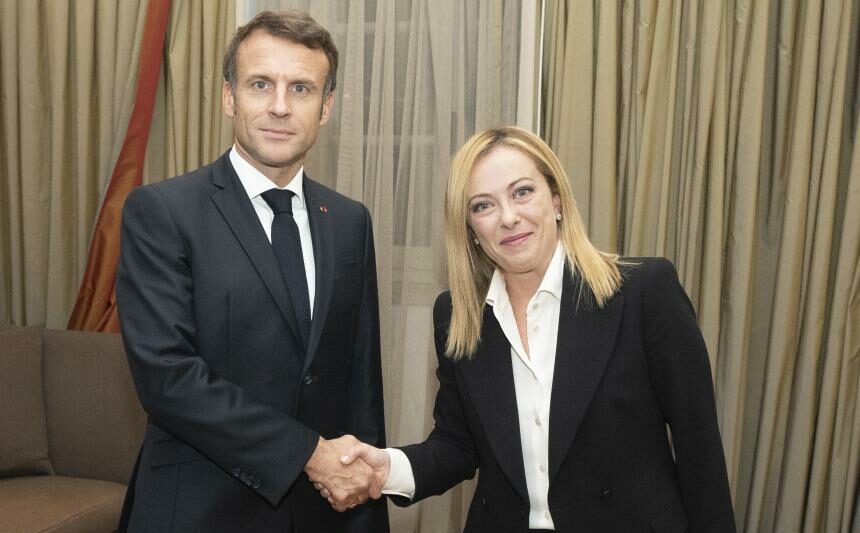Because France and Italy look with fear at Germany’s moves on energy, defense and more

Frightened by Germany, Macron reaches out to Italy. The analysis by Francesco Galietti, expert in strategic scenarios and founder of Policy Sonar
Macron fears that the Germans will make their way into the French spheres of influence. For this he caracolla in the Mediterranean and carves out a role in the East and the Caucasus (invasion foul in German territory).
By now we have made the call: Emmanuel Macron struggles not a little to pacify France, but spreads a metaphorical big hand on Italy and the Mediterranean.
In these hours the strikes in Paris and in the rest of France are once again reaching monstrous numbers, and the first protests were concentrated in the petrochemical sector. For now, the French authorities are reacting with acts of empire such as requisitions of refineries, to the point that Stéphane Sirot, a historical expert on trade unions, told Radio France that we have already plunged into a 'nuclear scenario'. Going back to the yellow vests that a few years ago put Paris to fire and sword is really a moment.
At the same time, within a few days, Macron: dined by candlelight with Mario Draghi in Paris, celebrated his association with Sant'Egidio, circled between high prelates and the Quirinale in Rome. And obviously he put his diplomats on the cross to get the new Italian nomenclature accredited in record time – the one headed by Giorgia Meloni, since relations with Forza Italia and Lega have already existed for some time.
Surely this out-of-town activism reflects a character trait that is very marked in Macron. But it would be wrong to reduce everything to psycho-politics. Rather, what we see can be traced back to the deep structure of France and its 'imperial self-awareness'.
Let's take the internal fragility, with the country often crossed by protests and unrest that chronologically precede the galloping inflation and the war in Ukraine. Well: here a decisive role is played by the presidential political system and the two-round electoral mechanism, which ensure governability and concentrate a lot of power in the hands of the President, but enhance the logic of the 'lesser evil'. In other words, it is not those who like it the most who prevail, but rather those who are less afraid. And never mind if in the first round the percentages collected are not exciting, or the participation in the vote is low, or there is still a strong growth of anti-establishment formations.
As for the frenetic activism by external lines, it is the result of a strategic reflection. Macron and the French elites have in fact understood (perhaps before the Germans) that a new iron curtain is falling between the West and Eurasia. This translates into a shrinking of many industrial chains, which will reposition themselves closer to the European continent, but also in a series of powerful elbows between the French and the Germans. The latter have raised the tone of their presence on the southern shore of the Mediterranean, relying on their development cooperation that has budgets never seen in Europe, and has a very clear mandate from Berlin: go and conquer. The trips to Africa of Annalena Baerbock, the German foreign minister, are showy, spectacular. Following him are crowds of German entrepreneurs, who certainly have not escaped the French observers.
In Paris, not only the prospect of increased competition with the Germans in the Mediterranean is frightening, but also the German rearmament, which directs enormous resources towards American military technologies and for now winks at NATO and the USA. France, which traditionally felt itself invested in European foreign and defense policy, was at the expense of this. At the moment, France underpins its alliances in Africa (the community of St. Egidio, with its vast network, is but one among many examples) and in the Mediterranean. The co-optation of Mario Draghi, which replaces the traditional interlocutors of Paris on Italy (Enrico Letta and Paolo Gentiloni), is explained as much as the increasingly close relations with Greece, also in terms of containment of Turkey, which has a very close and historical with Berlin.
Very interesting, as far as the very first words are concerned, was the active contribution offered by France to the birth of the European Political Community, the political platform that met for the first time in Prague a few days ago. It is an unprecedented format, which targets the European Union and sees the participation of the British, but also of Turks, Azeris and Serbs with an evident gaze towards the East and the Caucasus. Time will tell us if they will be able to feed this forum in Paris. For the moment, however, the French dynamism is striking in an area that, by geography, should belong to the Germans. This is how it works, the advance game: from time to time, there is some invasion foul.
This is a machine translation from Italian language of a post published on Start Magazine at the URL https://www.startmag.it/mondo/francia-italia-germania-energia/ on Sun, 30 Oct 2022 07:15:41 +0000.
